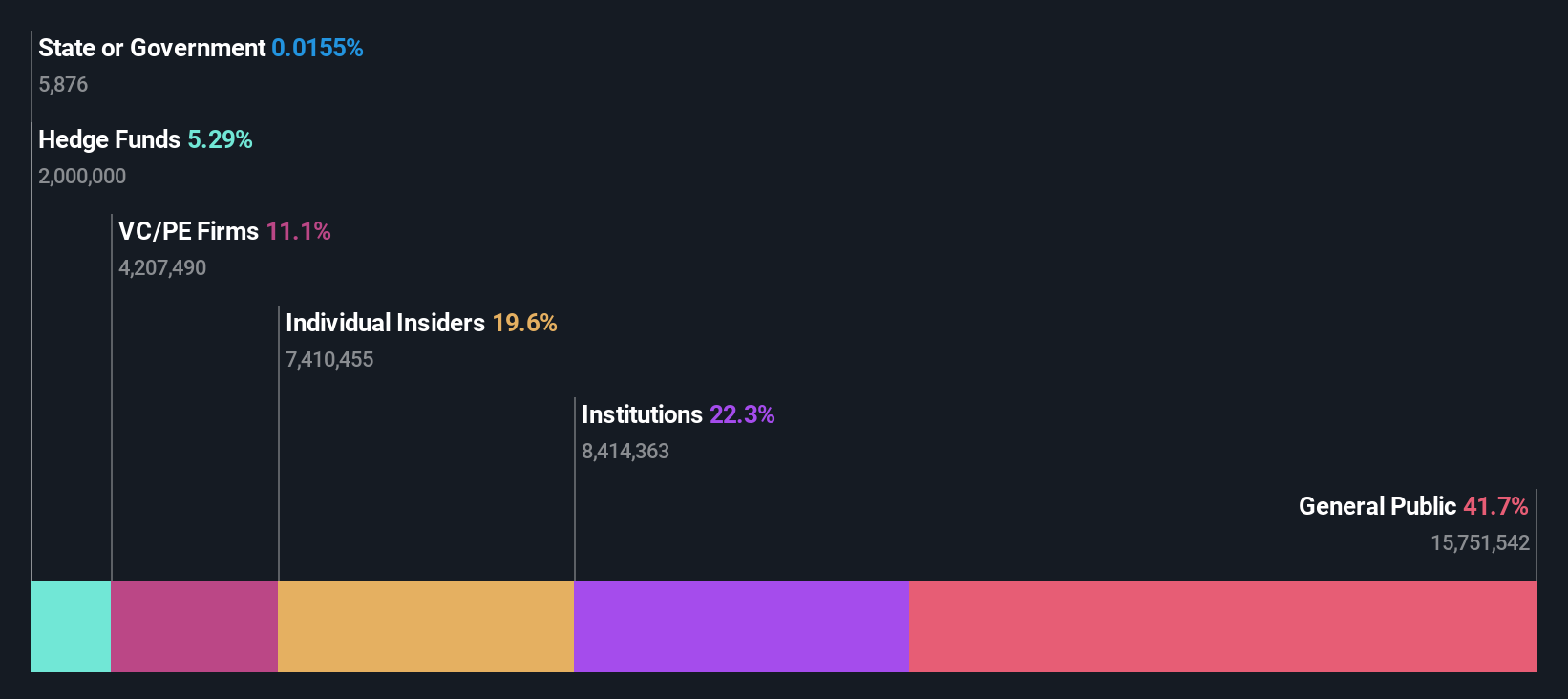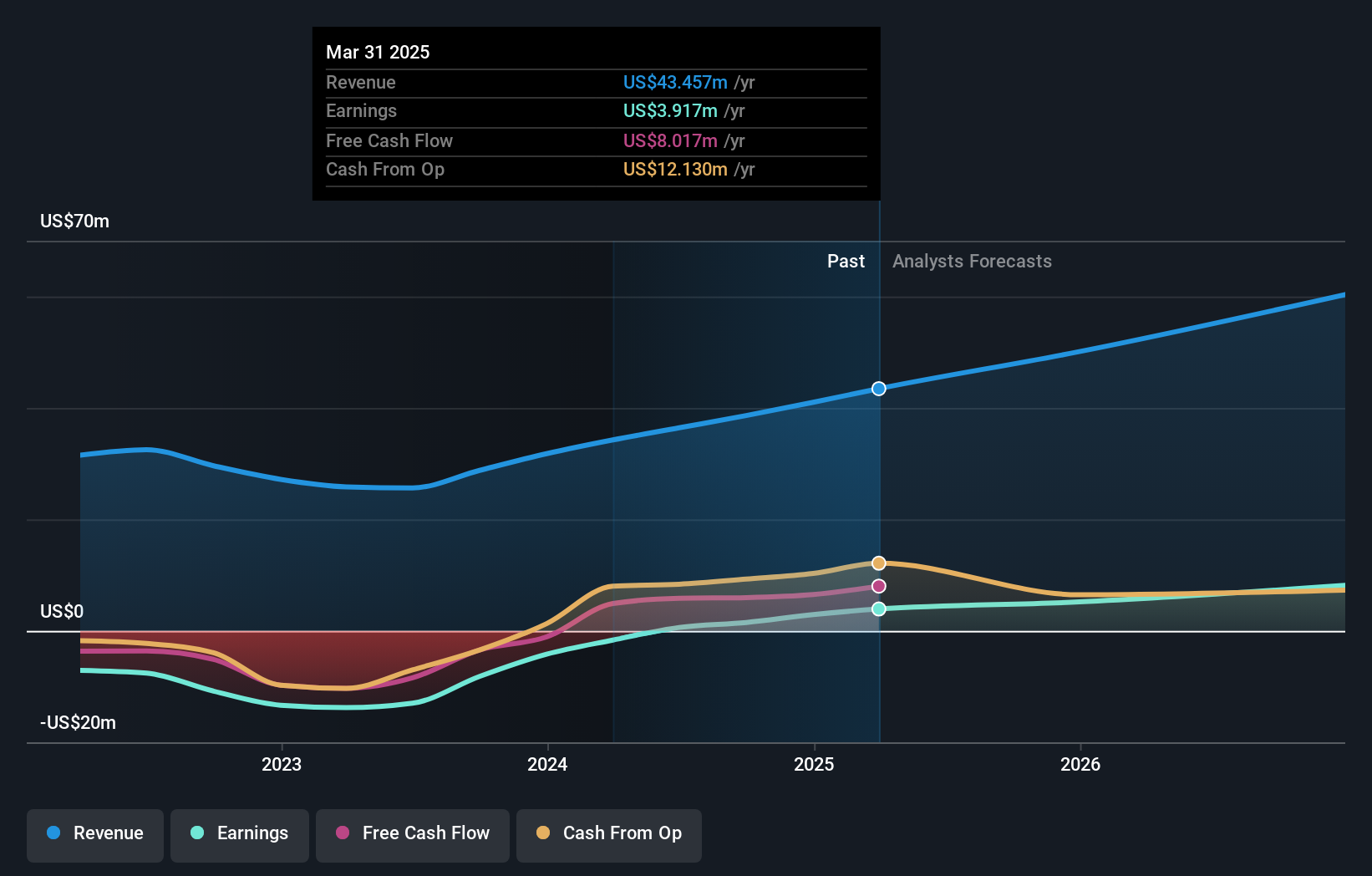- Israel
- /
- Medical Equipment
- /
- TASE:BWAY
Individual investors who hold 42% of BrainsWay Ltd. (TLV:BWAY) gained 12%, institutions profited as well
Key Insights
- Significant control over BrainsWay by individual investors implies that the general public has more power to influence management and governance-related decisions
- A total of 19 investors have a majority stake in the company with 50% ownership
- Insider ownership in BrainsWay is 20%
A look at the shareholders of BrainsWay Ltd. (TLV:BWAY) can tell us which group is most powerful. And the group that holds the biggest piece of the pie are individual investors with 42% ownership. In other words, the group stands to gain the most (or lose the most) from their investment into the company.
While individual investors were the group that reaped the most benefits after last week’s 12% price gain, institutions also received a 22% cut.
Let's take a closer look to see what the different types of shareholders can tell us about BrainsWay.
Check out our latest analysis for BrainsWay

What Does The Institutional Ownership Tell Us About BrainsWay?
Institutions typically measure themselves against a benchmark when reporting to their own investors, so they often become more enthusiastic about a stock once it's included in a major index. We would expect most companies to have some institutions on the register, especially if they are growing.
We can see that BrainsWay does have institutional investors; and they hold a good portion of the company's stock. This can indicate that the company has a certain degree of credibility in the investment community. However, it is best to be wary of relying on the supposed validation that comes with institutional investors. They too, get it wrong sometimes. When multiple institutions own a stock, there's always a risk that they are in a 'crowded trade'. When such a trade goes wrong, multiple parties may compete to sell stock fast. This risk is higher in a company without a history of growth. You can see BrainsWay's historic earnings and revenue below, but keep in mind there's always more to the story.

It looks like hedge funds own 5.3% of BrainsWay shares. That catches my attention because hedge funds sometimes try to influence management, or bring about changes that will create near term value for shareholders. Valor Management LLC is currently the largest shareholder, with 11% of shares outstanding. With 5.7% and 5.3% of the shares outstanding respectively, David Zacut and Masters Capital Management, L.L.C. are the second and third largest shareholders. David Zacut, who is the second-largest shareholder, also happens to hold the title of Top Key Executive.
Looking at the shareholder registry, we can see that 50% of the ownership is controlled by the top 19 shareholders, meaning that no single shareholder has a majority interest in the ownership.
Researching institutional ownership is a good way to gauge and filter a stock's expected performance. The same can be achieved by studying analyst sentiments. There are a reasonable number of analysts covering the stock, so it might be useful to find out their aggregate view on the future.
Insider Ownership Of BrainsWay
While the precise definition of an insider can be subjective, almost everyone considers board members to be insiders. Management ultimately answers to the board. However, it is not uncommon for managers to be executive board members, especially if they are a founder or the CEO.
I generally consider insider ownership to be a good thing. However, on some occasions it makes it more difficult for other shareholders to hold the board accountable for decisions.
Our most recent data indicates that insiders own a reasonable proportion of BrainsWay Ltd.. It has a market capitalization of just ₪771m, and insiders have ₪151m worth of shares in their own names. This may suggest that the founders still own a lot of shares. You can click here to see if they have been buying or selling.
General Public Ownership
With a 42% ownership, the general public, mostly comprising of individual investors, have some degree of sway over BrainsWay. While this size of ownership may not be enough to sway a policy decision in their favour, they can still make a collective impact on company policies.
Private Equity Ownership
With a stake of 11%, private equity firms could influence the BrainsWay board. Sometimes we see private equity stick around for the long term, but generally speaking they have a shorter investment horizon and -- as the name suggests -- don't invest in public companies much. After some time they may look to sell and redeploy capital elsewhere.

Next Steps:
It's always worth thinking about the different groups who own shares in a company. But to understand BrainsWay better, we need to consider many other factors.
I always like to check for a history of revenue growth. You can too, by accessing this free chart of historic revenue and earnings in this detailed graph.
Ultimately the future is most important. You can access this free report on analyst forecasts for the company.
NB: Figures in this article are calculated using data from the last twelve months, which refer to the 12-month period ending on the last date of the month the financial statement is dated. This may not be consistent with full year annual report figures.
Valuation is complex, but we're here to simplify it.
Discover if BrainsWay might be undervalued or overvalued with our detailed analysis, featuring fair value estimates, potential risks, dividends, insider trades, and its financial condition.
Access Free AnalysisHave feedback on this article? Concerned about the content? Get in touch with us directly. Alternatively, email editorial-team (at) simplywallst.com.
This article by Simply Wall St is general in nature. We provide commentary based on historical data and analyst forecasts only using an unbiased methodology and our articles are not intended to be financial advice. It does not constitute a recommendation to buy or sell any stock, and does not take account of your objectives, or your financial situation. We aim to bring you long-term focused analysis driven by fundamental data. Note that our analysis may not factor in the latest price-sensitive company announcements or qualitative material. Simply Wall St has no position in any stocks mentioned.
About TASE:BWAY
BrainsWay
Develops and sells noninvasive neurostimulation treatments for mental health disorders in the United States, East Asia, and internationally.
Flawless balance sheet with high growth potential.
Similar Companies
Market Insights
Community Narratives




